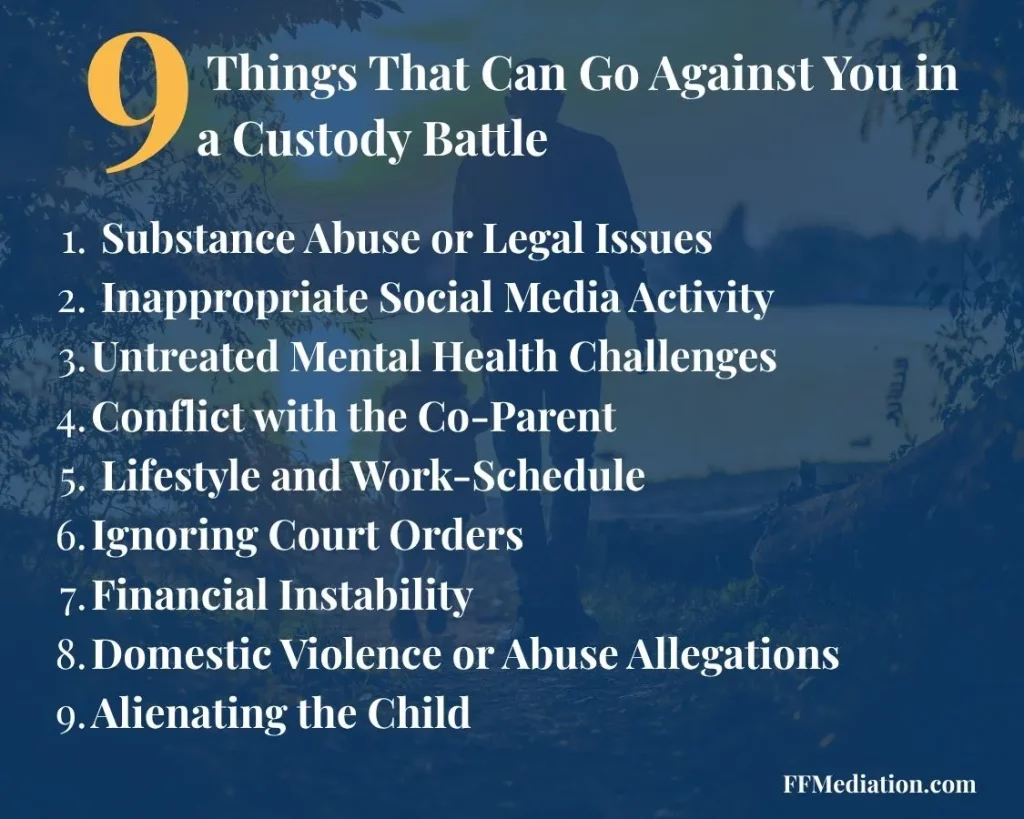Providing Divorce Mediation Services Throughout California
Providing Divorce Mediation Services Throughout California
Home » Divorce and Family law Blog » 9 Things That Can Be Used Against You in a Custody Battle CA

Are you facing a custody battle? One missed step— whether it is a late-night text message or a careless social media post, or even something you said to your child—can change the outcome of any court decision when you are least expecting it.
Before you worry: custody mediation is a smarter way forward. Child custody mediation avoids all the costs and conflicts of a lengthy court battle, so you can reach reasonable terms that are mutually beneficial.
California courts weigh all the factors and consider everything from how stable parenting is to what mistakes a parent has made (Family Code 3011).
Fortunately, this article will explain that process and bring you through everything that can be used against you in court and how to avoid them.
Custody battles are full of courtroom drama and attorneys costs. Custody Mediation is a productive and cost-effective solution in California to settle custody related issues. Dina Haddad is an expert child custody mediator. Book her FREE Custody Mediation Consult today.
California courts don’t pick winners and losers in custody cases – they’re required to decide based solely on the child’s best interests (Family Code 3011). This legal standard examines:
The process typically begins with mandatory mediation unless there’s evidence of abuse. If parents can’t reach agreement, the court may order:
Surprisingly, California law explicitly prohibits considering a parent’s gender or new relationships when determining custody.
The system favors parents who demonstrate responsibility, cooperation, and child-focused decision making.

California courts look at all aspects of your life to help determine what the custody arrangements will be.
Everything from what you post on social media to how you manage conflict with your ex could be scrutinized.
Basically, if there is evidence that you could negatively affect the child, it could really hurt your case.
The first step in avoiding these risks, is to understand these risks. Mediation, in most cases, is the best solution.
Risk: Substance abuse is taken very seriously by courts in custody cases. A single DUI in the last five years will not be helpful to your case.
Ongoing drug use of any kind (even marijuana, without proper medical permission) can get you supervised visitation.
Prescription drug abuse is also problematic. Judges require evidence that you can provide a sober and stable environment.
Solution: Enter a state licensed treatment program before your hearing. Keep records of sobriety (AA logs, clean drug tests, etc).
Don’t post anything on social media regarding alcohol and drugs (even make-believe “joking” posts about drinking culture).
A judge could modify child custody based on the child’s best interest, parental relocation, and non-compliance with existing order. Click on the link to know 9 reasons behind it.
Risks: Family Code 3040 presumes that if you “make habitually demeaning comments” about the other parent, it is harmful behavior.
Courts can find evidence whether the post gets taken down or not.
Solutions: Conduct a full audit of your social media presence, at least two years prior to your filing.
Change all accounts from public to private accounts, delete anything that creates questions, and do not post about your divorce or parenting issues going forward.
You may consider taking a complete break from social media while custody proceedings are ongoing.
Risk: Although California courts are not permitted to discriminate against appropriately managed mental health conditions, there are cases (including unmanaged mental health conditions interfering with your parenting ability) towards which the Court will scrutinize.
Some obvious examples might include – you have a serious, untreated, severe level of depression and simply can’t pick up your children from school.
Perhaps you are hospitalized and fail to follow up to arrange as to care. Both can put you at risk for losing custody.
Solution: Always document treatment and compliance with any medication regimen. Get a letter from your mental health professional declaring your condition under control with no interference in your parenting ability.
Let your consistency and stability be seen with regular meal times and time spent helping your kids with their homework.
Even child custody mediation with a narcissist can be tough. You need strategies and boundaries to deal with your ex-spouse. Read our blog to know further.
Risk: California Courts advocate for parents working successfully together and they want to see they can co-parent their children.
A documented history of events, e.g., unnecessary yelling during arguments or refusing to talk about medical decisions for a child, all are evidence that you experience difficulty with conflict resolution.
Even if you disagree (in parenting choices) if you express your frustration poorly, it certainly can be a problem for you!
Solution: Use court-preferred communication tools (like OurFamilyWizard) that create admissible records.
Stick to business-like communication about logistics only. Document all interactions factually, including screenshots of texts (without inflammatory commentary). Consider parallel parenting if high conflict persists.
Risk: Demanding jobs requiring constant travel or last-minute schedule changes can suggest unreliable parenting.
Frequent address changes or unconventional living situations (e.g., always staying with friends) may raise stability concerns.
Solution: Develop a detailed childcare plan showing backup providers. Secure stable housing (even a small consistent space is better than temporary luxury). Attend school events and document involvement.
Mediation can help you solve custody issues with little to no hostility and with custom schedules, instead of rigid court ones. It’s one of the best solutions, especially if you know what not to say in custody mediation and some dos and don’ts of it.
Risk: Violating any temporary orders – even minor infractions like being 15 minutes late consistently – demonstrates disregard for the legal process.
Missing deadlines for filings or evaluations suggests unreliability. Courts keep detailed records of compliance.
Solution: Use multiple calendar reminders for all court-related obligations. Document every custody exchange (time-stamped photos help).
If emergencies occur, notify the other parent and court immediately with evidence (e.g., hospital records).
Read More: When Can You Deny Visitation a Non-Custodial Parent?
Risk: While courts don’t require wealth, consistent inability to provide basics (evictions, utility shut-offs) or willful non-payment of child support undermines your case.
Sudden luxury purchases while pleading poverty damages credibility.
Solution: Create a realistic budget showing housing/food costs are covered. If unemployed, document job applications and vocational training.
Keep receipts for all child expenses (school supplies, medical copays). Consider opening a separate account just for child-related transactions to demonstrate responsible management.
Risk: Family Code 3044 creates a presumption of unsuitability to have sole or primary legal and physical custody for confirmed domestic violence.
Even unsubstantiated accusations of domestic violence can lead to temporary supervised visitation while investigations are pending.
“Abuse” includes more than physical violence; it includes psychological harm and harassment.
Solution: Follow all restraining orders to the letter. Finish any court-ordered batterer intervention early. Only communicate with the other parent if you are calm; use a parenting app to communicate if you are angry.
Document your safe home (child-proofing, emergency plans, etc.) Consider getting counseling voluntarily, to show you changed your patterns of behavior.
Risk: California courts do not tolerate parental alienation. For example, if you consistently plan fun events during the other parent’s time, interrupt the other parent’s calls, or “forget” to pack a toy for your child to take for their visit, that will be considered alienation.
Even how you appear when talking about the other parent can be noticed by custody evaluators.
Solution: If possible, adopt a neutral demeanor when you talk about the other parent. Do not interfere with calls/visitations, and if you can, keep consistent rules and expectations between households.
Keep a record of your encouragement of your child’s relationship with their other parent (for example. take screenshots of text messages when you remind your child to call their mom/dad).
Learn More: Can You Move out of State with Child & No Custody Agreement?
From social media missteps to scheduling conflicts, we’ve covered the nine key factors California courts scrutinize in custody battles—and how to address each.
Remember: Most risks can be mitigated with preparation and professional guidance. Skip the courtroom drama and costs—book a FREE Custody Mediation Consultation today to create a child-focused solution tailored to your family’s needs.
Related: How to Win Child Custody Mediation?